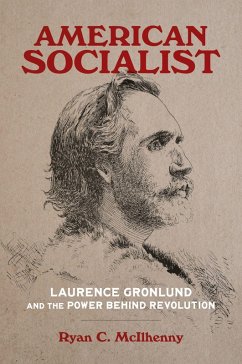Ryan C. McIlhenny's American Socialist is the first comprehensive biography of Laurence Gronlund (1844-1899), one of the nation's most persuasive proponents of socialism. Gronlund cultivated a unique polemic against capitalism by advocating positions that synthesized Marxism with Darwinian evolution, rejected class violence, and emphasized cooperation over competition. According to McIlhenny, a belief in a divine force advancing history toward a "cooperative commonwealth" underpinned his philosophy. Gronlund's books enjoyed a wide and dogmatic readership during the late nineteenth century, and his teachings inspired prominent Gilded Age figures, including Edward Bellamy, Leo Tolstoy, and Eugene V. Debs. American Socialist masterfully restores Gronlund to his place among the nation's most important political thinkers.
Bitte wählen Sie Ihr Anliegen aus.
Rechnungen
Retourenschein anfordern
Bestellstatus
Storno









